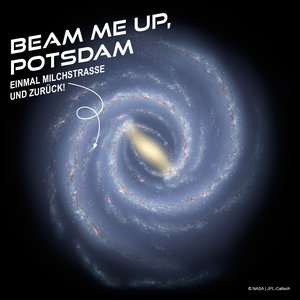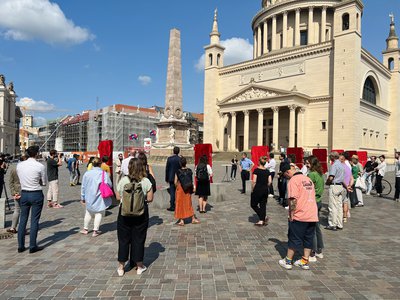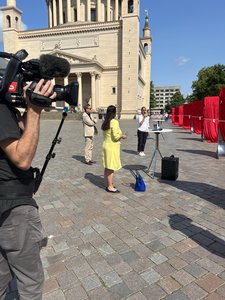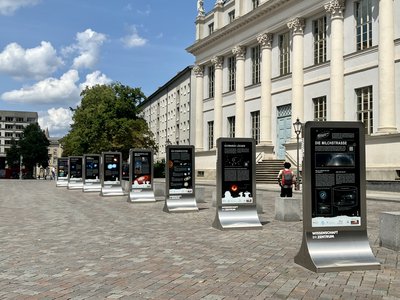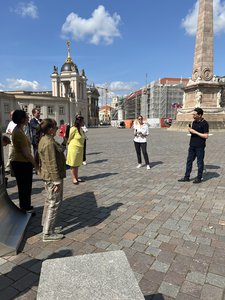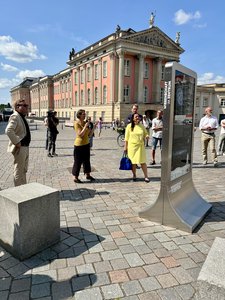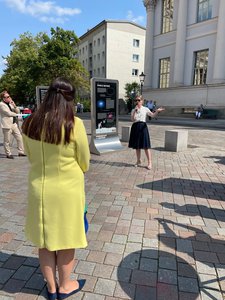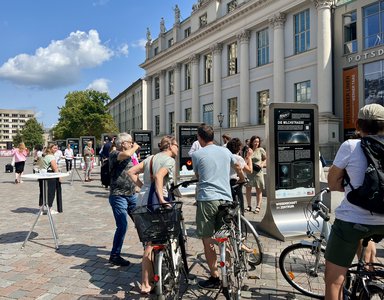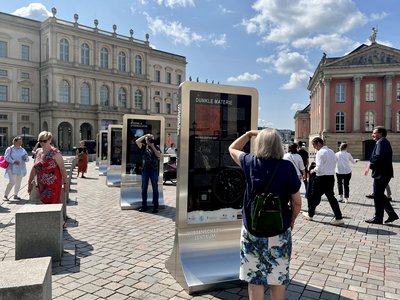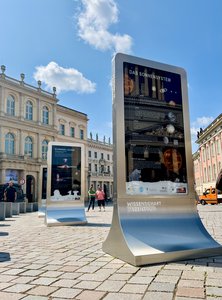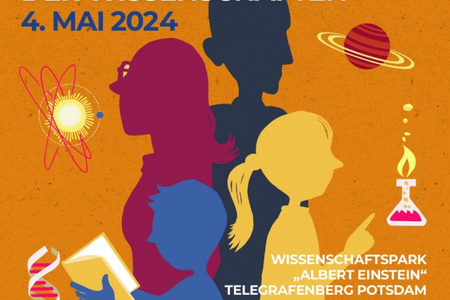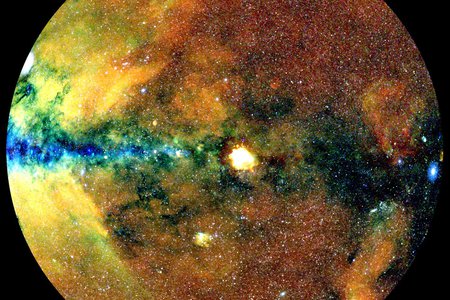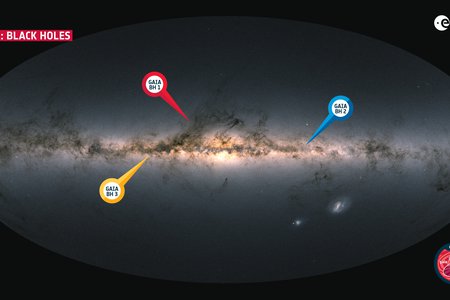Beam me up, Potsdam – to the Milky Way and back!
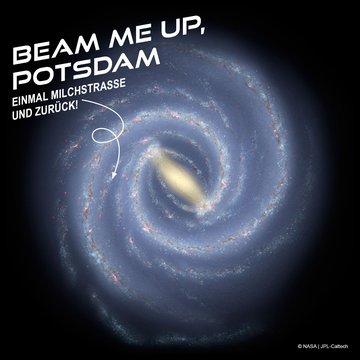
Poster for announcing the exhibition with an illustration of the Milky Way in the background.
Credit: proWissen e.V. , background: NASA/JPL-CaltechOn 14 July 2023, Brandenburg's Minister of Science, Research and Culture Dr Manja Schüle will open an open-air exhibition on the Milky Way at the “Alter Markt” square in Potsdam’s city centre. The project was developed as part of the Science Year "Our Universe" and includes accompanying events such as lectures, student workshops and podcasts with Potsdam researchers.
A journey to the Milky Way is now possible thanks to a new exhibition in Potsdam’s city centre. In fact, we are already in the Milky Way, our home galaxy, and our planet Earth is orbiting one of its countless stars, the Sun. On Friday, 14 July 2023, at 10:30 a.m., eight steles will be unveiled in Potsdam’s “Alter Markt” square near the Nikolaikirche church, explaining how the Milky Way is structured, what it is made of and our place in the universe. With information on fascinating topics such as star clusters, planets, black holes, dark matter and gravitational waves, visitors will be able to explore the Milky Way at any time.
The project was initiated by the Leibniz Institute for Astrophysics Potsdam (AIP) as part of the Science Year 2023 – Our Universe, and is managed by the proWissen e.V. association. The Milky Way is a central research topic of the AIP, but also of the Potsdam partner institutions, the Max Planck Institute for Gravitational Physics (AEI) and the Department of Astrophysics at the University of Potsdam. Other partners are the German Electron Synchrotron DESY in Zeuthen and the Urania Planetarium Potsdam. Matching the themes of the steles, proWissen produced eight episodes for the podcast “Beam me up, Potsdam” (in German) with experts from the participating research institutions. In these audio clips, scientists introduce the respective topics and provide insights into their current research. The experts from AIP are Dr Marcel Pawlowski on dark matter, Dr Katja Weingrill on the spiral arms of the Milky Way and the Gaia satellite, and Dr Alexander Warmuth on the Sun and Solar Orbiter. The podcasts are available on all major podcast platforms.
To complement the exhibition and podcasts, a human-size banner of the Milky Way will provide an opportunity for selfies with our home galaxy. The websites below provide information on other accompanying events such as workshops for schoolchildren and science talks.
The steles will be on display at the Alter Markt in Potsdam's city centre until the end of December 2023, when they will move to the Volkspark Potsdam as a permanent exhibition.
Photos of the opening (Credit: AIP)
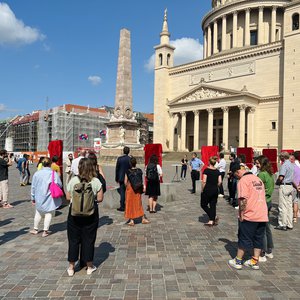
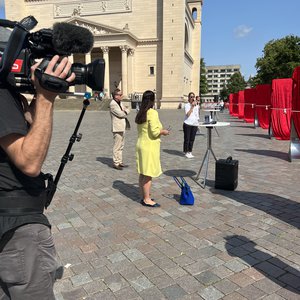
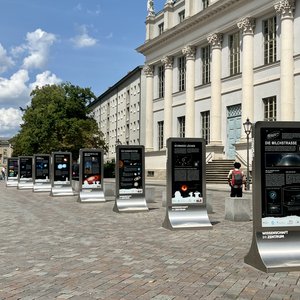
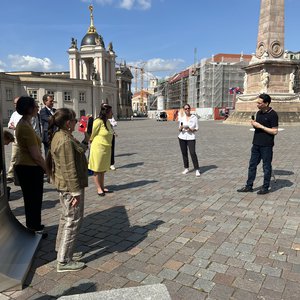
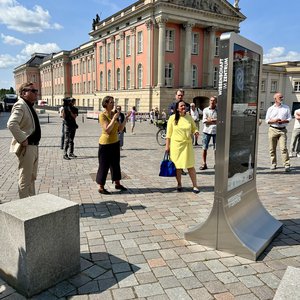
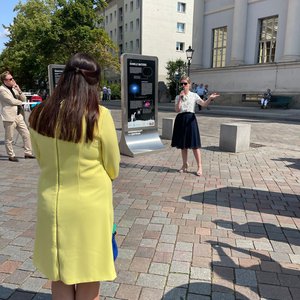
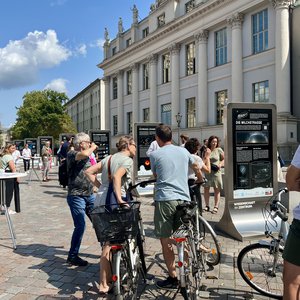
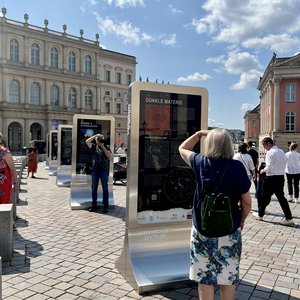
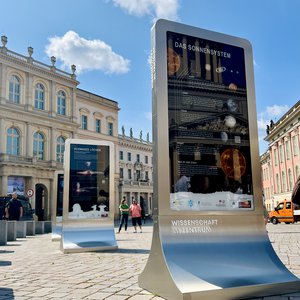
Further information
To the podcasts
https://beam-me-up.podigee.io/episodes
More about the exhibition and further events
https://www.wis-potsdam.de/de/beam-me-potsdam-einmal-milchstrasse-und-zurueck
https://www.aip.de/de/pr/wissenschaftsjahr-2023/ (incl. pdf of the stelae)
https://www.wissenschaftsjahr.de/
Science Year 2023
The immense expanse of the universe and the question of the origin of the earth and of mankind have preoccupied our culture, our self-image and science over the millennia. Despite the progress of knowledge in recent decades, however, our cosmos remains in large parts a fascinating unknown. What are black holes? Are we alone in the universe? What makes our Earth a habitable planet and how can we protect it? These and other questions are addressed by the Science Year 2023 – Our Universe. From exhibitions and school activities to hands-on activities: The view from Earth into space and from space onto Earth will take place from a variety of perspectives and invites young and old to an exciting exchange with science and research. The Science Years are an initiative of the Federal Ministry of Education and Research (BMBF) together with Wissenschaft im Dialog (WiD).
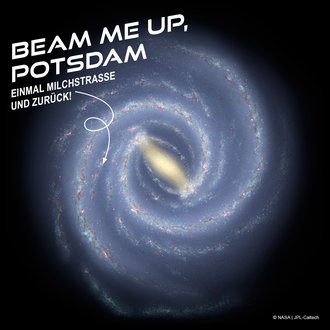
Poster for announcing the exhibition with an illustration of the Milky Way in the background.
Credit: proWissen e.V. , background: NASA/JPL-CaltechOn 14 July 2023, Brandenburg's Minister of Science, Research and Culture Dr Manja Schüle will open an open-air exhibition on the Milky Way at the “Alter Markt” square in Potsdam’s city centre. The project was developed as part of the Science Year "Our Universe" and includes accompanying events such as lectures, student workshops and podcasts with Potsdam researchers.
A journey to the Milky Way is now possible thanks to a new exhibition in Potsdam’s city centre. In fact, we are already in the Milky Way, our home galaxy, and our planet Earth is orbiting one of its countless stars, the Sun. On Friday, 14 July 2023, at 10:30 a.m., eight steles will be unveiled in Potsdam’s “Alter Markt” square near the Nikolaikirche church, explaining how the Milky Way is structured, what it is made of and our place in the universe. With information on fascinating topics such as star clusters, planets, black holes, dark matter and gravitational waves, visitors will be able to explore the Milky Way at any time.
The project was initiated by the Leibniz Institute for Astrophysics Potsdam (AIP) as part of the Science Year 2023 – Our Universe, and is managed by the proWissen e.V. association. The Milky Way is a central research topic of the AIP, but also of the Potsdam partner institutions, the Max Planck Institute for Gravitational Physics (AEI) and the Department of Astrophysics at the University of Potsdam. Other partners are the German Electron Synchrotron DESY in Zeuthen and the Urania Planetarium Potsdam. Matching the themes of the steles, proWissen produced eight episodes for the podcast “Beam me up, Potsdam” (in German) with experts from the participating research institutions. In these audio clips, scientists introduce the respective topics and provide insights into their current research. The experts from AIP are Dr Marcel Pawlowski on dark matter, Dr Katja Weingrill on the spiral arms of the Milky Way and the Gaia satellite, and Dr Alexander Warmuth on the Sun and Solar Orbiter. The podcasts are available on all major podcast platforms.
To complement the exhibition and podcasts, a human-size banner of the Milky Way will provide an opportunity for selfies with our home galaxy. The websites below provide information on other accompanying events such as workshops for schoolchildren and science talks.
The steles will be on display at the Alter Markt in Potsdam's city centre until the end of December 2023, when they will move to the Volkspark Potsdam as a permanent exhibition.
Photos of the opening (Credit: AIP)









Further information
To the podcasts
https://beam-me-up.podigee.io/episodes
More about the exhibition and further events
https://www.wis-potsdam.de/de/beam-me-potsdam-einmal-milchstrasse-und-zurueck
https://www.aip.de/de/pr/wissenschaftsjahr-2023/ (incl. pdf of the stelae)
https://www.wissenschaftsjahr.de/
Science Year 2023
The immense expanse of the universe and the question of the origin of the earth and of mankind have preoccupied our culture, our self-image and science over the millennia. Despite the progress of knowledge in recent decades, however, our cosmos remains in large parts a fascinating unknown. What are black holes? Are we alone in the universe? What makes our Earth a habitable planet and how can we protect it? These and other questions are addressed by the Science Year 2023 – Our Universe. From exhibitions and school activities to hands-on activities: The view from Earth into space and from space onto Earth will take place from a variety of perspectives and invites young and old to an exciting exchange with science and research. The Science Years are an initiative of the Federal Ministry of Education and Research (BMBF) together with Wissenschaft im Dialog (WiD).
Images
Poster for announcing the exhibition with an illustration of the Milky Way in the background.
Big screen size [1000 x 1000, 130 KB]
Original size [1867 x 1867, 360 KB]
Big screen size [1000 x 750, 200 KB]
Original size [4032 x 3024, 2.3 MB]
Big screen size [1000 x 1333, 350 KB]
Original size [3024 x 4032, 2.6 MB]
Big screen size [1000 x 750, 190 KB]
Original size [4032 x 3024, 1.8 MB]
Big screen size [1000 x 1333, 330 KB]
Original size [3024 x 4032, 2.3 MB]
Big screen size [1000 x 1333, 370 KB]
Original size [3024 x 4032, 2.6 MB]
Big screen size [1000 x 1333, 300 KB]
Original size [1536 x 2048, 460 KB]
Big screen size [1000 x 780, 220 KB]
Original size [3743 x 2921, 2.0 MB]
Big screen size [1000 x 749, 190 KB]
Original size [3619 x 2714, 1.6 MB]
Big screen size [1000 x 1349, 270 KB]
Original size [2707 x 3653, 1.3 MB]
